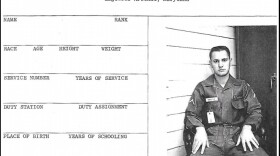The app uses music and audio to help amputees lessen the pain and discomfort of walking with a prosthetic leg.
In the 17 years since military operations began in Iraq and Afghanistan, more than 1,700 service members have had combat related amputations. The majority of them lost one or both legs.
For many of them, the long, involved process of getting comfortable with prosthetic legs prevents them from getting back to their lives. It's a problem that inspired University of Miami professor Bob Gailey to develop a new app called ReLoad.
"It's kind of like taking back a physical therapist in your pocket," Gailey said.
Veterans are testing ReLoad at the VA in Miami and at Walter Reed National Military Medical Center in Bethesda, Maryland. Study participants put sensors on their legs, their prosthetics, and their lower backs whenever they walk or exercise. The sensors sync up with the app and give audio feedback to the user in real time.
In particular, it warns them when they are walking with an uneven gait - a problem that's common in amputees and can lead to back pain, arthritis, and other muscle and joint problems.
"It will give you automatic commands to tell you how to improve just like you were at the physical therapy clinic," Gailey said.
The app was created by University of Miami schools of medicine and music. Users listen to music when they walk, but the sound becomes distorted when their gait is uneven. Once the user's gait gets back on track, so does the music.
"Losing one's lower limb and walking on a prosthesis does set you up for having long term problems," said Paul Pasquina, the director of the rehabilitation department at the Uniformed Services University and Walter Reed.
He explained that if a prosthetic makes a person uncomfortable, that can lead to decreased mobility and exercise, which in turn can cause diabetes, heart problems or strokes.
"Whatever therapy they taught me when I first lost my limb, I was getting by but not doing it in a way that was good for my body," says army veteran Rosemary Salak. She lost her left leg above the knee in a car accident after returning home from duty.
For years, she favored her healthy leg, and her uneven gait caused a lot of problems with her right knee. Eventually she decided to come to Walter Reed, where she was recruited by her physical therapist to test ReLoad.
Even though she's been using the app only a few months, she says it's made a lot of difference in the pain she was feeling and the way she's walking.
Researchers are recruiting more veterans to test ReLoad, and eventually hope to have the app available for the millions of people in America who have lost limbs.
This story was produced by the American Homefront Project, a public media collaboration that reports on American military life and veterans. Funding comes from the Corporation for Public Broadcasting and the Bob Woodruff Foundation.




